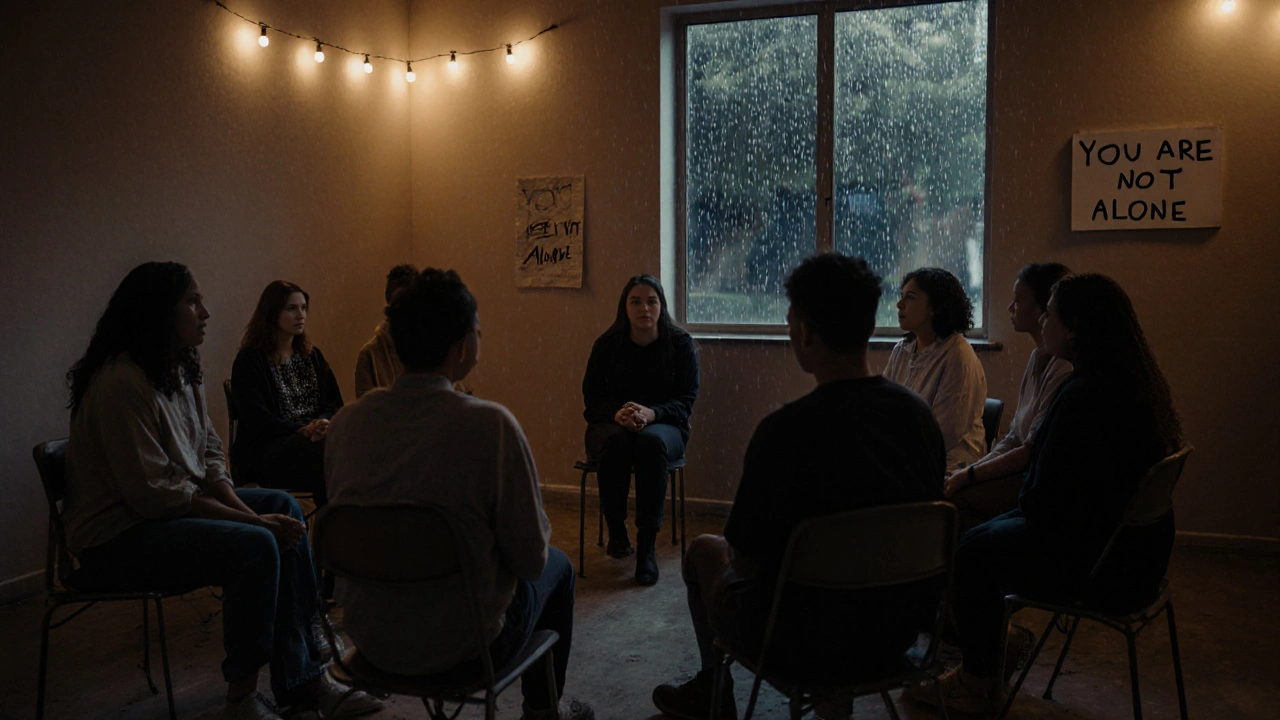Sex work is not a monolith. It’s people navigating survival, autonomy, stigma, and systemic neglect - often without access to care that actually understands them. Many mental health services are built for people who have stable housing, legal protection, and social support. Sex workers rarely fit that profile. That’s why trauma-informed care isn’t just a buzzword - it’s the only way mental health support can work for this community.
What Trauma-Informed Care Really Means
Trauma-informed care means seeing the person, not just the symptom. It’s not about asking, "What’s wrong with you?" It’s asking, "What happened to you?" For sex workers, trauma isn’t always a single event. It’s the daily weight of being ignored by police, turned away from clinics, judged by strangers, and treated like a statistic. This isn’t PTSD from one incident - it’s complex trauma, built over years of survival mode.
Traditional therapy often pushes for "processing trauma" or "revisiting memories." But for someone who’s still in danger - whether from clients, landlords, or law enforcement - that can be retraumatizing. Trauma-informed care starts with safety: physical, emotional, and relational. It means letting the person set the pace. It means not pushing them to talk if they’re not ready. It means believing them without needing proof.
Why Most Mental Health Services Fail Sex Workers
Many therapists mean well. But they’re trained in models that assume clients have access to transportation, stable housing, and a support network. They ask, "How do you feel about your family?" when the person’s family cut them off years ago. They suggest group therapy when the client fears being recognized. They use CBT techniques that demand emotional regulation - but regulation is a luxury when you’re afraid to sleep at night.
Studies from the Global Network of Sex Work Projects show that over 60% of sex workers who sought mental health help reported being misunderstood, judged, or even reported to authorities by providers. That’s not a flaw in the client - it’s a flaw in the system. When care is disconnected from reality, it doesn’t heal. It harms.
What Trauma-Informed Care Looks Like in Practice
Real trauma-informed care for sex workers follows three core rules: safety, choice, and collaboration.
- Safety: Sessions happen in neutral, non-judgmental spaces - not clinics with visible logos that could be linked to sex work. Some programs offer telehealth with encrypted apps. Others meet in community centers or even mobile vans.
- Choice: The client decides what to talk about, when, and how. No forced disclosure. No pressure to name names or describe incidents. No "homework" that puts them at risk.
- Collaboration: The provider doesn’t play the expert. They ask: "What do you need right now?" and then help build a plan around it. That might mean connecting them to housing support, legal aid, or peer groups - not just therapy.
One program in Vancouver runs weekly peer-led circles where sex workers talk about stress, safety, and survival - no therapist present. The structure is simple: no advice, no solutions, just listening. Many say it’s the first time they’ve felt heard in years.

Where to Find Trauma-Informed Support
There are organizations around the world built by and for sex workers. They don’t just offer therapy - they offer community, advocacy, and practical help.
- SWOP (Sex Workers Outreach Project) - Offers peer support, referrals, and trauma-informed counseling in over 20 U.S. cities. They also train other providers on how to work with sex workers respectfully.
- Red Umbrella Fund - A global grantmaker that funds sex worker-led organizations. Many of these groups run mental health drop-ins, crisis lines, and safe housing networks.
- Scarlet Alliance (Australia) - The national sex worker advocacy group. They have a mental health referral network across Australia, including Perth, where services are tailored to local laws and risks.
- Global Network of Sex Work Projects (NSWP) - Maintains a directory of trauma-informed services by country. All listed providers have been vetted by sex workers themselves.
- Therapy for Trauma - An online directory of therapists trained in trauma-informed, sex worker-affirming care. Filters let you find providers who offer sliding scale fees, telehealth, and language options.
These aren’t just services - they’re lifelines. And they’re run by people who’ve been where you are.
How to Tell If a Provider Is Truly Trauma-Informed
Not every therapist who says they’re "trauma-informed" actually is. Here’s what to look for:
- They don’t ask for your legal status or work history unless you bring it up.
- They respect your boundaries - if you say "I’m not ready to talk about that," they don’t push.
- They know the difference between consensual sex work and trafficking. They don’t assume you’re a victim.
- They offer flexible scheduling, low-cost or free sessions, and options for anonymity.
- They connect you to other resources - housing, legal aid, medical care - not just talk therapy.
If a provider asks for ID, pushes you to tell your story in detail, or seems uncomfortable when you mention your work - walk away. You deserve better.

Self-Care That Actually Works
Self-care isn’t just bubble baths and affirmations. For sex workers, it’s about reclaiming control in a world that takes it away daily.
- Grounding techniques: When you feel overwhelmed, try the 5-4-3-2-1 method: Name 5 things you see, 4 you can touch, 3 you hear, 2 you smell, 1 you taste. It brings you back to your body - not your trauma.
- Peer connection: Talking to someone who gets it - even online - reduces isolation. Many find support in private Facebook groups or Discord servers run by sex workers.
- Body-based practices: Yoga, dance, or even walking barefoot on grass can help reconnect with your body after experiences that made you feel disconnected from it.
- Journaling without judgment: Write whatever comes up - anger, fear, boredom, joy. Don’t edit it. Don’t show it to anyone unless you want to.
Healing isn’t linear. Some days you’ll feel strong. Others, you’ll just want to sleep. That’s okay. Trauma-informed care doesn’t demand recovery - it demands respect.
What You Can Do Right Now
You don’t need to wait for a perfect system. Start small.
- Save the contact info for one local sex worker-led organization. Even if you’re not ready to reach out, knowing it’s there changes everything.
- Download an encrypted messaging app like Signal. Use it to connect with peers or crisis lines.
- Write down one thing you need right now - safety, rest, money, someone to listen - and keep it on your phone. When you’re overwhelmed, read it.
- If you’re in Australia, call Scarlet Alliance’s peer support line: 1800 012 442. They don’t ask for your name.
You don’t have to heal alone. And you don’t have to be fixed to be worthy of care. You’re already doing the hardest work there is - surviving. Now, it’s time to be seen.
Is trauma-informed care only for people who’ve been trafficked?
No. Trauma-informed care is for anyone who’s experienced ongoing stress, violence, or neglect - whether from clients, police, family, or society. Many sex workers experience trauma not from trafficking, but from daily stigma, criminalization, and lack of access to basic rights. Trauma isn’t defined by how it happened - it’s defined by how it affects you.
Can I get trauma-informed care anonymously?
Yes. Many organizations offer services without requiring your real name, ID, or work details. Telehealth platforms like Therapy for Trauma let you use a pseudonym. Peer support groups often use screen names. Your privacy is part of the safety protocol.
What if I can’t afford therapy?
Cost shouldn’t be a barrier. Many sex worker-led organizations offer free or sliding-scale counseling. Scarlet Alliance in Australia, SWOP in the U.S., and Red Umbrella Fund partners worldwide provide no-cost mental health support. Some groups also offer gift cards for groceries or transport to help remove practical barriers.
Are there online support groups for sex workers?
Yes. Private, moderated groups on platforms like Discord and Facebook exist in many countries. These are often run by sex workers themselves and prioritize confidentiality. Look for groups with clear safety rules - no screenshots, no doxxing, no judgment. You can find links through Scarlet Alliance or NSWP’s website.
Can I use my regular therapist if they’re not trained in trauma-informed care?
It’s risky. If your therapist doesn’t understand the realities of sex work - like fear of reporting, stigma, or survival-based choices - they may unintentionally harm you. They might misinterpret your coping strategies as "resistance" or "denial." If you’re unsure, ask them directly: "Have you worked with sex workers before? How do you handle confidentiality and safety in this context?" If they hesitate or give vague answers, it’s okay to look elsewhere.
Next Steps for You
If you’re reading this, you’re already taking a step - even if it’s just curiosity. The next step doesn’t have to be big. It could be saving a number. It could be texting a friend you trust: "I’ve been feeling really heavy lately." It could be walking outside and breathing for five minutes without thinking about anything else.
Healing isn’t about fixing yourself. It’s about finding people and spaces where you don’t have to pretend. You’ve survived this long. Now, you deserve care that sees you - not your work, not your past, not your stigma. Just you.
